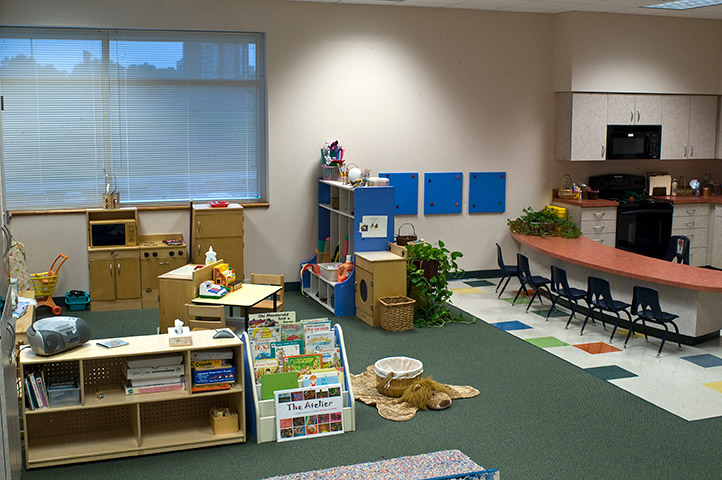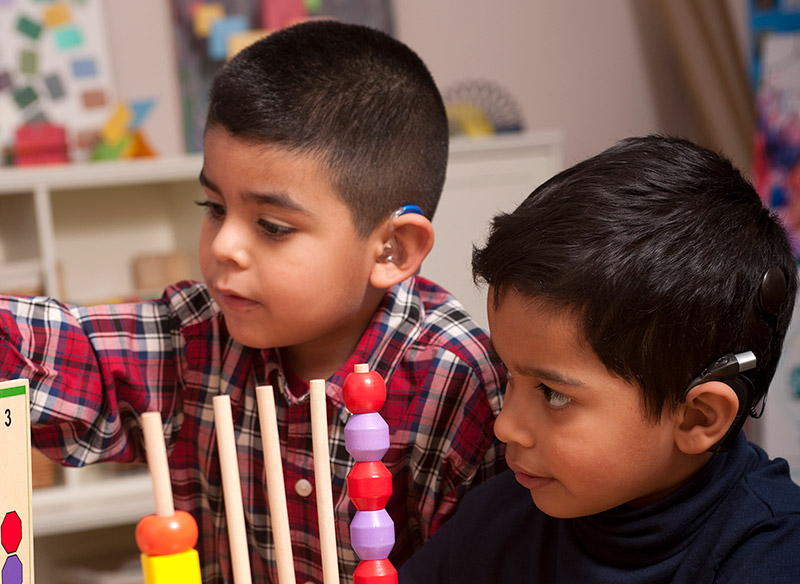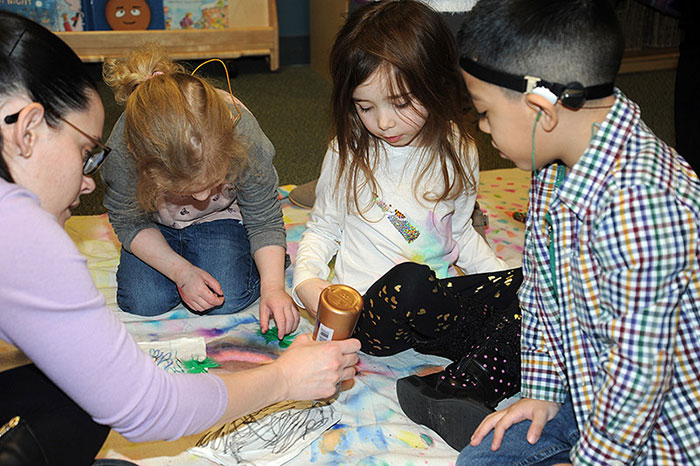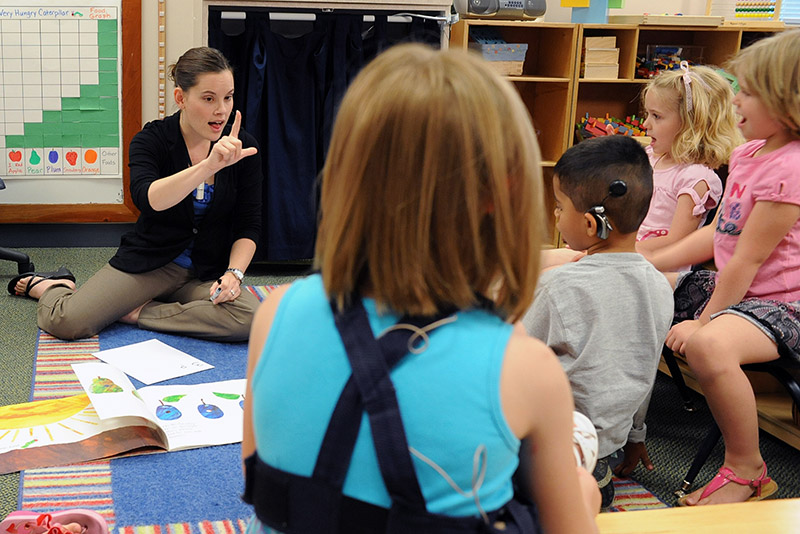*Information on this page was originally developed by a team that created a website for families focused on “raising deaf kids” (see About Us). The content may have been edited or updated.
Going to childcare Many children who are deaf or hard of hearing go to childcare. Find out more about helping your child have the best possible experience at childcare.
Working with Childcare Centers
Share this page with your child's childcare providers. This will help them better understand how to help and interact with your child.
You may be worried about putting your child in a childcare center. It is important for your childcare provider to know how to work with your child who is deaf or hard of hearing. Some accommodations will make the setting more appropriate for your child.
In
childcare, your
child who is deaf or hard of hearing
may
need
help:
- To communicate with other children
- To be understood by her teacher or childcare provider
- To join activities and feel included
|
These pages will help you and your childcare provider give your child the best possible experience.
Read this page so you can:
- Talk to the staff at childcare

- Keep your child safe at childcare
- Make a difference at childcare
- Support daycare teachers & staff
Talk to the Staff at Childcare
It may be that staff at your childcare setting have never worked with a child who is deaf or hard of hearing (DHH). They may not know what to expect with children who are DHH. Because of this, they may:
- Not know how to include him in group activities.

- Be unsure how to communicate with him.
- Wonder how he will communicate with other children.
- Be uncomfortable with his technology.
Find ways to help the staff become comfortable. Talk to them and teach them what you have learned.
Tell the childcare staff about your child
- Give your childcare provider or teacher information and suggestions about activities to do with your child who is DHH. This will make them more comfortable about interacting with your child. If you ask, your early intervention provider may be able to visit the center and give additional information to the staff.
- Teach the teachers about hearing aids and hearing aid batteries. Show them how to check that hearing aids are working. Help them see how to re-insert the hearing aids in case they come out. Again, your infant-family teacher may be able to help with this. See:
https://www.babyhearing.org/hearing-devices/Pages/Frequently-asked-questions-about-device-use.aspx
- Tell them how to help comfort your child.
- Explain about your child's hearing. Ask the audiologist for a paper that shows what your child can hear and not hear, with and without her aids. Visit:
https://www.babyhearing.org/what-is-an-audiogram
- If he has cochlear implants, someone from the implant team may visit the childcare center to help teach staff about implants. For more information, visit:
https://www.babyhearing.org/devices/how-does-a-cochlear-implant-work
- If you are using sign language to communicate with your child, show some signs to the childcare staff. This will help your child feel included.
- Make posters with pictures of the signs your child knows and uses.
- Help staff learn these important signs. Practice with them.
- Make sure they can watch you when you sign with your child.
- Encourage and support them to do whatever they can to communicate with your child.
For more information see:
Childcare for children with hearing loss - Hearing Like Me
Safety at Childcare
It can be helpful to support you child in ways that keep you informed about what is happening at childcare. Your hearing child can come home and tell you what happened at childcare. Your young child who is deaf or hard of hearing (DHH) may not be able to communicate the same thing.
- Ask your child how her day went.
- Ask the teacher for a daily report so that you can discuss the day with your child. It can be helpful to use a notebook that goes back and forth to school. Ask the teacher to jot a few notes about your child's day.

- If the childcare center has a digital camera, ask that they take some pictures of your child during daily activities.
- Ask them to include a short description of what is happening in each picture.
- Use the pictures as part of the daily report for your child.
- This will help you know how your child is doing.
- Watch how your child acts when you approach the childcare center. Is she happy and excited to start the day?
- If you see any bruises or cuts on your child, ask her how she got hurt.
- Tell your childcare provider if your child has allergies.
- Tell your childcare provider how to contact you.
- Trust your feelings. Never bring your child to a childcare provider, babysitter, or teacher if you don't feel comfortable.
Make a Difference at Childcare
You can make a difference!
Read these ideas for helping the staff care for your child.
- Talk with your childcare providers and teachers about your child's individual needs.
- Explain that being alone will not help her.
- Let the staff know you want her to interact and play with other children.
- Every child needs to learn how to get along with other people.
- Let the staff know that you understand it is more difficult to communicate with your child who is deaf or hard of hearing (DHH).
- Share tips and advice on how to communicate with your child.
- Show the staff or give examples of how to include her in everyday activities.
-
If you are signing to your child, help childcare staff find resources. There are many resources on the internet and YouTube for beginning sign language with young children. See
https://www.babysignlanguage.com/childcare/
Help your child play in groups when she is old enough
Here is a list of group play ideas that are friendly to children who are DHH. You can share these ideas with your childcare center. Suggest to the childcare staff that they:
Play games and activities that do not need the use of hearing.
- Games like Marco Polo would be very hard for children who are DHH.
- Duck-duck-goose can be fun and easy to understand, just by adding some visual cues (walk like a duck but change the movement to be the goose).
- For the game tag, you can add a bright hat to the game. Say that whoever is “It" has to wear the bright hat. This helps children who are DHH see who's “It" and who's not.
- Explain the rules for all activities or games. Every time you teach a game or activity, explain things step by step to the child. Show the children what to do.
- Musical chairs can also be played by turning the lights on and off instead of turning the music on and off.
- Many people think that children who are DHH already understand the rules for games. That may not be true. She may miss out on many things compared to a hearing child. This is because she cannot hear like a hearing child does.
- Hold a fun workshop for all of the children (and teachers) to learn about being DHH. If the child uses sign language, learn basic important signs for “please, how are you?, do you understand?, good morning, good bye, good job, come over, and excuse me."
- Hang up a
sign language alphabet poster (http://www.dltk-teach.com/alphabuddies/asl/) at the daycare or classroom if the child signs.

- Add pictures and stories to explain what it is like to be DHH. This helps other people to learn to be sensitive and thoughtful about the needs of a child who is DHH.
- Always try to remember that the child is DHH.
- Use visual signals to get everyone's attention. For some children who are deaf, flashing the lights and using appropriate hand signals may be what is needed to gain their attention. They can gently tap the table to get the child's attention too.
WORKING WITH DAYCARE CENTERS
You can share these pages with your daycare provider so they can give your child the best possible experience.
Read the following sections so you can guide daycare providers about ways to work with your child: